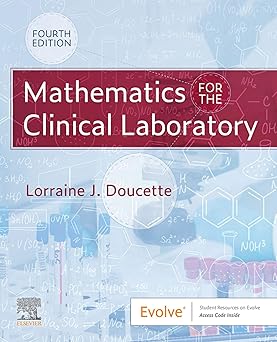Key Highlights
- •Focuses specifically on essential mathematics for the clinical laboratory setting.
- •Features clear, step-by-step explanations and numerous practice problems with answers.
- •Updated 4th Edition reflecting current laboratory practices and calculation needs.
Description
Feeling intimidated by the math needed in the clinical lab? Don't sweat it! Mathematics for the Clinical Laboratory, 4th Edition by Lorraine J. Doucette is your go-to guide for mastering essential lab calculations. This book break down complex concepts into easy-to-understand steps, making clinical lab math accessible for everyone.
Who is this book for? This book is perfect for clinical laboratory science students, medical laboratory technicians (MLT), medical technologists (MT), and even experienced lab professionals who need a refresher or a reliable reference. If you're preparing for certification exams like the ASCP or AMT, this is an invaluable study tool.
What problem does this book solve? Many students and professionals find laboratory mathematics challenging. This book tackle that head-on, providing clear explanations and practical examples directly relevant to the tasks you perform daily. Forget abstract theories; this focuses on the real-world calculations needed for dilutions, concentrations, statistics, and quality control in the clinical setting. It helps build confidence and reduce errors when performing critical lab procedures.
What will you gain from reading it? You'll develop a strong foundation in clinical laboratory mathematics. You'll learn how to perform calculations accurately and efficiently, understand the principles behind them, and gain the confidence to apply these skills in your studies or job. The step-by-step approach and numerous practice problems ensure you really grasp the material. This book help you become more competent and reliable in the laboratory.
Why is it worth reading? This 4th edition is updated to reflect current laboratory practices. Lorraine Doucette's clear writing style and focus on practical application make learning less daunting. It’s not just a textbook; it’s a practical workbook designed to build essential skills. Many students and educators reccomend this book for its clarity and relevance. It’s an essencial resource for anyone serious about a career in the clinical laboratory.
Stop letting math hold you back! Download the PDF of Mathematics for the Clinical Laboratory, 4th Edition today and start mastering those crucial calculations!
FAQ
Is this book suitable for someone who isn't great at math?
Absolutely! The book is designed to break down concepts step-by-step, starting with basic principles. It's known for its clear explanations, making it helpful even if you find math challenging.
What specific math topics does this book cover?
It covers essential clinical laboratory calculations, including dilutions, concentrations (like molarity and normality), solution preparation, basic statistics, quality control math, unit conversions, and logarithmic functions relevant to lab work.
Are there practice problems included in the book?
Yes, the book includes numerous practice problems with answers, allowing you to test your understanding and build confidence in applying the concepts.
Will this book help me prepare for my MLT or MT certification exam (like ASCP)?
Definately! Many students use this book specifically for exam preparation as it covers the mathematical competencies required for certification boards like ASCP and AMT.
Is this book only for students, or can working techs benefit too?
It's beneficial for both! Students will find it essential for learning, while working techs can use it as a valuable refresher or a handy reference for less common calculations.
How is the 4th edition different from previous editions?
The 4th edition is updated to align with current laboratory practices and may include refined explanations, new examples, or updated content based on changes in the field.
Reader Reviews
About the Author
Lorraine J. Doucette, EdD, MT(ASCP), CLS(NCA), is an experienced educator in the field of Clinical Laboratory Science. With her strong academic background and practical credentials, she specializes in making complex laboratory concepts, particularly mathematics, accessible and understandable for students and professionals preparing for successful careers in the medical laboratory.
